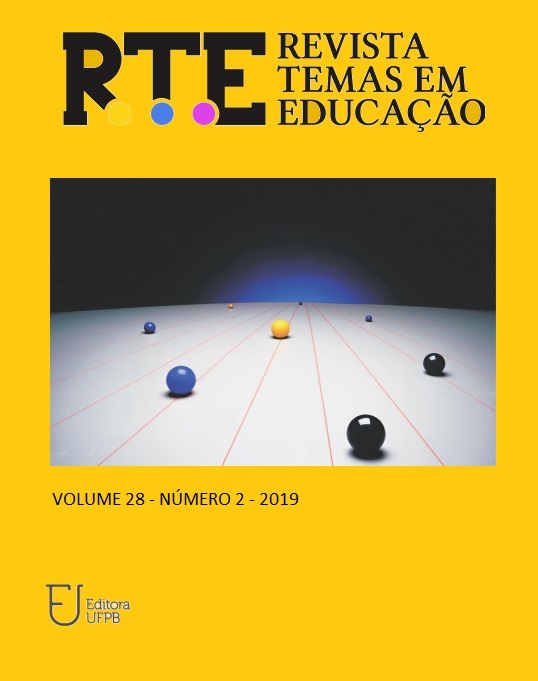THE IMPORTANCE OF RELIGIOUSITY AND HEALTH RELATIONSHIPS IN THE PRACTICES OF TRADITIONAL CHILDREN CAREERS
THE IMPORTANCE OF RELIGIOUSITY AND HEALTH RELATIONSHIPS IN THE PRACTICES OF TRADITIONAL CHILDREN CAREERS
DOI:
https://doi.org/10.22478/ufpb.2359-7003.2019v28n2.42199Keywords:
Health, Popular Education, Spitituality, Popular Religiosity, MediumshipAbstract
In this article are shared discoveries coming from dialogues with quilombolas: healers, midwives and priests of religions of African matrix. These dialogues with quilombola caretakers took place in four states: Belém; Maranhão; Minas Gerais and Bahia, in seven quilombos, in Brazil. These dialogues took place within the scope of the Quilombola Protagonismo Project in the Fight for Health and Social Rights, which had as one of its objectives to identify traditional practices of Care, Health Promotion and cultural manifestations. This article aims to give greater visibility to the importance of religiosity in the health care of traditional quilombolas caregivers. As methodological procedures, with these social actors, individual interviews were used. The practices undertaken by these social actors merge much more deeply with their convictions and practices in the field of spirituality and religiosity than with the oral transmission of knowledge by their ancestors, differently from what was initially expected, therefore the present article privileges this cut. Another conclusion was that these actors are community leaders considered important by their communities, and also, despite the manifestations of religious intolerance inside and outside the quilombos, they are aware of their importance in the fight for quilombola rights.
Downloads
References
ALMEIDA, Alexander Moreira de; LOTUFO NETO, Francisco (2004). “A mediunidade vista por alguns pioneiros da área mental”. Rev. psiquiatr. Clín., São Paulo, 313,132-141. Consultado em 19.02.2017, em, http://www.scielo.br/scielo.php?script=sci_arttext&pid=S0101-60832004000300003&lng=en&nrm=iso.
CARVALHO, Sidnei (org.) (2012). Mediunidade de A a Z. Limeira: Editora do Conhecimento.
JUNIOR, Adolfo de Mendonça. O Espiritismo e algumas religiões mediúnicas: umbanda e candomblé. X Encontro Nacional de História Oral: Testemunho, História e Política. 2010. Consultado em 04.03.2017, em http://www.encontro2010.historiaoral.org.br/resources/anais/2/1270781165_ARQUIVO_Semelhancasediferencasentrealgumasreligioesmediunicas.pdf. Acesso em:
FUNDAÇÃO PALMARES. Certificação Quilombola. Disponível em: http://www.palmares.gov.br/?page_id=37551. Acesso em: 10/10/2018.
LIMA, Carla Moura. Protagonismo Quilombola: na Luta por Saúde e Direitos Sociais. Rio de Janeiro: Fiocruz, 2016.
NUNES, Patricia Maria Portela e Martins, Cynthia Carvalho. O poder e a autoridade dos autodesignados pajés na construção de uma perspectiva de direito em comunidades quilombolas: religiosidade e territorialidade na Baixada Manhanhense. In: Martins, Cynthia Carvalho; Catanhende Filho, Aniceto; Pereira Junior, Davi (Orgs.). Insurreição de saberes: tradição quilombola em contexto de mobilização. Manaus: UEA Edições, 2013.
PRICE, Richard (1999). Reinventando a história dos quilombos: rasuras e confabulações. Afro-Ásia, Salvador: UFBA, 23,241-265.
Downloads
Published
How to Cite
Issue
Section
License
Authors who publish in this journal agree to the following terms:
. Authors retain the copyright and grant the journal the right to first publication, with the work simultaneously licensed under the Licença Creative Commons Attribution that allows the sharing of the work with acknowledgment of authorship and initial publication in this magazine. . Authors are authorized to assume additional contracts separately, for non-exclusive distribution of the version of the work published in this journal (eg, publishing in institutional repository or as a book chapter), with acknowledgment of authorship and initial publication in this journal.
. Authors are permitted and encouraged to publish and distribute their work online (eg in institutional repositories or on their personal page) at any point before or during the editorial process, as this can generate productive changes, as well as increase impact and citation of the published work (See O Efeito do Acesso Livre).



















